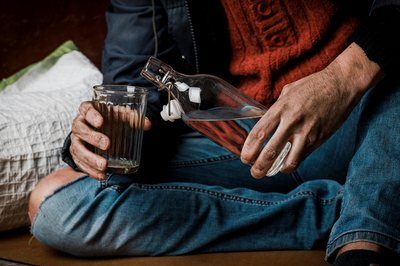
If you find yourself wanting to drink more while social distancing, you’re far from alone.
A strong support network is a critical part of the recovery process for many people suffering from alcohol use disorder. Support groups are an especially popular source of empathy and understanding.
However, the coronavirus pandemic has changed the way we move in the world with social distancing and stay-in-place orders keeping us in our homes and out of the community centers, church basements, and hospital event rooms where support group meetings are usually held.
So what does this mean for people who depend on these meetings to stay sober? Here’s a closer look at the situation.
Alcohol Use Disorder and COVID-19
To understand why a strong support network is especially important during the novel coronavirus pandemic, it’s important to know several things. For starters, excessive alcohol consumption can interfere with the body’s immune system. Given that immunocompromised people are especially vulnerable to the most severe coronavirus symptoms, this could put people with alcohol use disorder in the high-risk category. To that end, the World Health Organization recently issued a warning stating that alcohol could put people at increased risk for the disease.
Another factor complicating the situation? In general, more people who are stuck at home during the pandemic are increasing their consumption of alcohol. In fact, off-premise alcohol sales spiked by a staggering 55 percent in the third week of March compared to the previous year. In short, more people are drinking alcohol for a variety of reasons ranging from boredom to depression. People with substance abuse have these same reasons with the added albatross of addiction.
The takeaway? Many people are drinking more during these stay-at-home days, and people with alcohol use disorder are far from immune. In fact, while many first turned to alcohol as a form of self-medication and coping mechanism, it’s these same imperatives that might drive them to relapse during the pandemic.

A virtual meeting may be just what you need to stay on track to lasting sobriety.
A Different Kind of Support Network
“We’re all in this together” is a tagline of the coronavirus. While this is true to a degree, the reality is that loneliness and isolation are huge problems at this time. While this applies to everyone, it can be especially problematic for people with alcohol use disorder, especially if it means losing access to their support systems.
The good news? Technology makes it easier to stay connected with other people, including a support community. Alcoholics Anonymous, in particular, has stepped up and is now using digital platforms to help A.A. group members maintain their sobriety during these challenging times. Digital A.A. meetings allow participants to focus on the message of recovery.
That’s not all. A.A. groups and members are taking other measures as well, such as exchanging emails, using social media, and creating contact lists.
While attending meetings — digital or otherwise — can help support ongoing sobriety if you haven’t yet kicked the habit or if you feel like you might relapse, they’re rarely enough on their own. It’s also important to accept that we don’t know how long this will last and your attitude may change over time. The sooner you find and start participating in a support group, the better positioned you’ll be in the long run.
“A.A. in the digital age has certainly taken on a new meaning in these challenging times, reminding its members and those searching for help that A.A. is not just a “place,” but exists in the hearts, minds and help offered,” says A.A. on its website.
The right rehab center can also serve this purpose. Enter St. Louis’s Harris House. Providing targeted treatment for people with substance use disorders for more than 50 years, Harris House can help you or a loved one overcome alcohol use disorder and start on the path to sobriety and overall good health. Call us to learn about admissions today.







